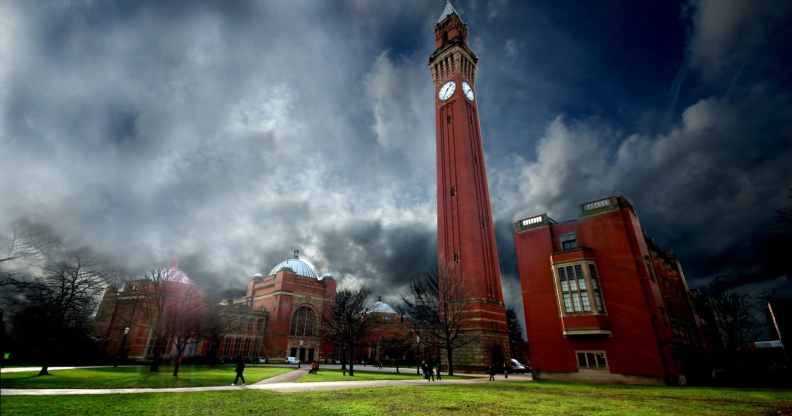Conversion therapy survivor demands apology from University of Birmingham after being given electro-shocks by researcher

The University of Birmingham, where a gay man says he was subjected to months of conversion therapy. (Getty)
A gay man who endured months of electro-shock conversion therapy at the University of Birmingham psychology department is seeking an apology.
Speaking out under the pseudonym “Chris”, he told the BBC that in the 1970s he went to his GP for advice after realising that he was gay.
The GP told him that he would refer him to a University of Birmingham psychologist who would be able to “cure” him.
The months of “treatment” he attended there were so traumatic, they would lead to 40 years of “extreme” post traumatic stress disorder.
Now 74 years old, Chris was in his 20s when he began seeing the clinical psychologist, who he recalls told him that “even having a sex change” would be better than being gay.
The treatment, which he was told was guaranteed to work, aimed to associate pain with his feelings of attraction towards men.
Chris said: “I would be sat in a room, with a projector screen and photographs to look through. An electrode was attached to my ankle and wrist.
“A photo of a man would pop up, and if you weren’t quick enough to flick to the next picture, you would get a hefty electric shock. Then photos of women would pop up, with no consequence at all.”
Chris attended several sessions a week for months, but his suffering was not limited to the walls of the University of Birmingham psychology department.
When he began working as a teacher, he was still attending the sessions, but told his workplace that he was being treated for depression.
He “lost everything”, however, as he suspects one of the researchers “treating” him outed him to the school, which fired him. He subsequently found that no other school would interview him, forcing him to change careers.
After months of conversion therapy and decades of PTSD, Chris simply wants an apology from the University of Birmingham.
Around three years ago, Chris began looking for closure after decades of suffering, and tracked down a postgraduate student who worked in the psychology department in the 1970s. The student was able to provide him with evidence of the electro-shock conversion therapy.
But the university refused to acknowledge his experience, he said, and “tried to deny that this ever happened”.
The university initially said it had “no record” of the “treatment”, as it only kept records for 25 years. Later, it “blamed the researcher, saying it was just his private project, and nothing to do with the university”.
However, Chris insists all of his “treatment” took place at the university, with both students and staff present.
“I don’t want to sue the university into oblivion, I just want an apology for the years of pain they have put me through,” he said.
“I just want closure.”
He is also calling for the UK government to finally ban conversion therapy, and “fix this mess” after years of promises.
He said: “In this country it is illegal to train a dog using electric shocks, but it is not illegal to use electric shocks on a gay man.
“I have had over 40 years of pain, and an immensely frustrating life. Why has the government still not banned conversion therapy?”
As it stands, 20 US states and a number of countries around the world including Malta and Germany have passed bills to ban conversion therapy, while others like Canada are moving towards a ban.
Meanwhile, it has been more than two years since the UK government pledged to ban conversion therapy – yet the traumatising practice is still legal.
Daniel Browne, the chairman of Warwickshire Pride, recently described how the traumatising practice is taking place on his doorstep and insisted that a ban is desperately needed.
He told CoventryLive: “The community feels that [a ban] is long overdue and that conversion therapy is a form of torture.
“Conversion therapy is happening in Warwickshire right now, it’s legal. It’s curing people of being gay, that’s the thought behind it.”
The University of Birmingham told PinkNews in a statement: “We support unequivocally the position of all major UK therapy professional bodies, including the NHS and British Psychological Society, that conversion therapy, where the aim is to change a person’s sexual orientation or to suppress gender identity, is unethical, degrading and potentially harmful.
“As a university we are an active member of Stonewall and are committed to promoting equality, diversity and fairness irrespective of sexual orientation or gender identity.
“While we are unable to find any evidence that this was a university-sanctioned research project, we are aware that during the late 1960s/70s there may have been some isolated activity of this nature.
“We believe that this was wholly inappropriate and deeply regret that such potentially harmful activity may have taken place; we have engaged with the individual on a number of occasions to highlight our regret.
“We understand that some members of our community may be affected by this case and are providing access to additional support.”

